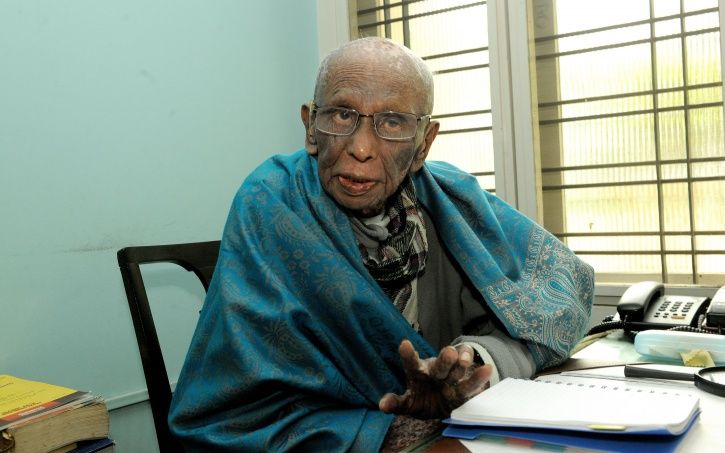The Evolution of Privacy Rights in India: From Justice Puttaswamy to Data Privacy: (Part - 1)
This blog post explores the historical and legal progression of privacy rights in India, culminating in the landmark case - Justice K.S. Puttaswamy and Anr. vs. Union of India (UOI) and Ors. This article underscores the growing significance of data privacy in the digital age, with implications for individuals, businesses, and international alignment, including India's Digital Personal Data Protection Act, 2023.
RIGHT TO PRIVACY


Honourable Justice K S Puttaswamy (Retd.)
Introduction
The concept of the "Right to privacy" is a fundamental right that has evolved over time.
The Right to Privacy found its recognition by the Supreme Court of India in the historic verdict of Justice K. S. Puttaswamy & Anr. vs. Union Of India & Ors., a case that not only solidified the right to privacy but also laid the foundation for the "right to data privacy." It is strongly recommended to read the full verdict of the case to understand its significance.
Origins of the Right to Privacy in India
Constitutional Roots: The right to privacy in India traces its origins to the Constitution. While the term "privacy" was not explicitly mentioned in the constitution of India, the right to privacy is considered as an intrinsic part of the fundamental right to life and personal liberty under Article 21.
PUDR vs. Union of India: The 1977 case of People's Union for Democratic Rights (PUDR) vs. Union of India marked a significant step in recognizing privacy as an essential component of personal liberty. The Supreme Court emphasized the need to safeguard individual privacy against unlawful intrusion by the state.
R. Rajagopal vs. State of Tamil Nadu: In the 1994 case of R. Rajagopal vs. State of Tamil Nadu, the Supreme Court affirmed that the right to privacy is an integral part of the right to life and personal liberty. It acknowledged the right to protect one's private life from unwarranted publicity.
The Curious Case of Justice Puttaswamy
In the year 2012 - In a legal battle that unfolded as just another Public Interest Litigation (PIL), a 86-year-old retired High Court Judge, Justice Puttaswamy, stood resolute against the collection of sensitive personal data like biometric data of Indian citizens by the Union of India without a legal basis. This monumental case was taken up by a nine-judge bench of the Supreme Court.
At the heart of this judicial showdown was the government's Aadhaar scheme, a biometrics-based identity card that sought to become mandatory for accessing essential government services and benefits.
As the courtroom drama unfolded, a critical question loomed large: Did the Indian Constitution extend its protective embrace to the right to privacy? The Attorney General, a formidable defender of the Union of India, infamously contended that the Right to Privacy found nowhere within the Indian Constitution implying that the Indian citizens have no right to privacy!
In this high-stakes legal duel, the Honourable Justice K S Puttaswamy became the symbol of an individual's unwavering commitment to preserve the sanctity of privacy against the backdrop of governmental intrusion. The outcome of this legal showdown would echo through the annals of Indian jurisprudence, forever altering the landscape of privacy rights in the digital age.
And, the Verdict is...
In 2017, the Supreme Court of India delivered a historic judgment in the case of Justice K. S. Puttaswamy & Anr. vs. Union Of India & Ors.
This verdict redefined the contours of the right to privacy in India as described below:
1. Fundamental Right: The court unequivocally declared that the right to privacy is a fundamental right, intrinsic to Article 21 of the Constitution. This recognition placed privacy on par with other fundamental rights.
2. Balancing Test: The judgment articulated a "balancing test" to determine the validity of the state's interference with an individual's privacy. It emphasized that any intrusion must be justified by a legitimate state interest and meet the tests of necessity and proportionality (to fulfil that legitimate interest)
3. Digital Personal Data Protection Act, 2023: The Puttaswamy verdict laid a strong foundation for the DPDP Act, 2023. It acknowledged the importance of personal data protection as an essential aspect of an individual's right to privacy.
The Right to Data Privacy
The "right to data privacy" gained prominence in India following the Puttaswamy judgment:
1. Aadhaar Verdict: In 2018, the Supreme Court delivered another significant verdict related to data privacy in the Aadhaar case. It upheld the constitutional validity of Aadhaar while emphasizing the need for stringent data protection measures.
2. Personal Data Protection Bill: India has recently enacted the Personal Data Protection Act, 2023, which aims to regulate the processing of personal data and establish individuals' rights over their data. The act is a direct outcome of the judgement in case of Justice K.S. Puttaswamy and Anr. vs. Union of India (UOI) and Ors.
Significance and Future Implications
The recognition of the right to data privacy is of immense significance in the digital age:
1. Individual Empowerment: It empowers individuals to have control over their personal information and ensures that it is used responsibly.
2. Business and Innovation: It fosters trust in the digital ecosystem, benefiting businesses and promoting innovation.
3. International Alignment: India's recognition of data privacy aligns with global standards and enhances cross-border data flow.
Conclusion
The journey from recognizing the right to privacy as a fundamental right to acknowledging the emerging "right to data privacy" has been transformative. The Puttaswamy verdict laid the foundation for safeguarding individual privacy in the digital era, and the continued evolution of data protection laws in India reflects the commitment to upholding this fundamental right.
Further Reading
Full Judgement text of this case (Download PDF)
